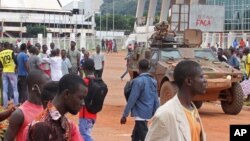A fresh wave of violence in the capital of the Central African Republic has killed at least 36 people and displaced 30,000 more. A top question now is whether the C.A.R. will postpone the October 18 elections until later this year.
Transitional authorities in the C.A.R. had been warning of an election delay even before a new wave of violence began last Friday. France is against a postponement, while the U.N. is calling for polls by the end of the year.
International Crisis Group analyst Thibaud Lesueur said holding a vote under current conditions is unrealistic and would only add fuel to the fire with the risk of increasing tensions.
"If elections are organized now the risk is that armed groups not accepting the vote will try to disturb the election process so the population wont be able to vote freely and in a safe environment,” said Lesueur.
The fighting was triggered by the killing of a motorcycle-taxi driver in Bangui's mostly Muslim neighborhood of PK5. Muslims sought revenge against Christians in other neighborhoods.
“The recent violence in Bangui shows that intercommunal tensions are still very strong, and not only in the center of the country, but also in the capital," said Lesueur. "It also has a political dimension with elections to be held at the end of this year this way for some armed group leaders to put pressure on the authorities and vie for political influence."
Displaced persons
With more than 360,000 people displaced within the C.A.R., polls will be a logistical challenge. Nearly half-a-million, most of them Muslim, are refugees in neighboring countries.
Remy Djamouss, a local journalist and human rights activist, said, “For elections to be credible, people need to able to vote. Politicians need to be able to campaign. This is not possible, as many areas are still controlled by armed groups."
Transitional authorities together with 12,000 U.N. peacekeepers and 1,000 French troops have struggled to calm tensions over the past year and it is unclear what more could be done in the months ahead as disarmament efforts have stalled.
The ex-Seleka rebels who ousted formed president Francois Bozize in 2013 still control territory, primarily in the north. They called for reinforcements in Bangui this week, as anti-Balaka militia there began rallying fighters from around the country.
Interim President Catherine Samba Panza blames Bozize and other politicians for rallying the militias, accusing them of an attempted coup.
The armed groups have little interest in changing the status quo.
Analysts predict tensions will remain high at least until polls are held.




